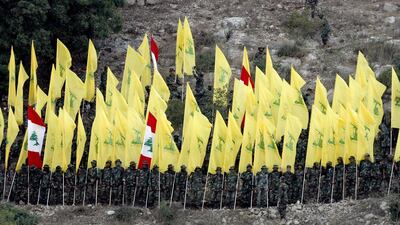ABU DHABI // Bahrain has deported several Lebanese citizens it says are linked to the Shiite Hizbollah movement, in the latest move by the GCC to increase pressure on Lebanon.
“A number of Lebanese residents have been deported after it was confirmed that they belonged to and supported terrorist Hizbollah,” Bahrain’s interior ministry said on Monday.
The ministry did not name the deportees, or say how many there were or when they left the kingdom. However, Lebanese media reported last week that up to 10 families were asked to leave Bahrain within 24 hours.
The move was the latest step by the GCC targeting Hizbollah and followed an announcement by Saudi Arabia on Sunday night that it would punish anyone inside the kingdom who belonged to the group, helped finance it, sympathised with it or harboured its members. Saudis would face “severe penalites”, while foreigners would be deported if found to be guilty, the government said.
The change in the GCC’s Lebanon policy came after its foreign minister refused to condemn the attacks on Saudi diplomatic missions in Iran following Riyadh’s execution of a prominent Saudi Shiite cleric, and as the regional cold war between Riyadh and Tehran heats up.
Saudi Arabia in February suspended $4bn (Dh14.7bn) in aid to Lebanon's security forces. This was followed days later with several GCC countries warning their citizens against travelling to Lebanon – a popular holiday destination with Gulf citizens, while the UAE banned its citizens from travelling there.
Then, on March 2, the GCC declared Hizbollah a terrorist organisation.
The Gulf countries also imposed targeted sanctions on Hizbollah-linked companies and individuals, and pushed the Arab League to declare the group a terrorist organisation last week.
Branches of Hizbollah in the GCC have long been classified as terrorist groups by Gulf countries, but Saudi Arabia and the UAE had refrained from classifying Hizbollah as a terrorist group because it is part of the government. But over the past month, both countries have taken unprecedented steps to ratchet up pressure – directly and indirectly – on Hizbollah.
Since then, Hizbollah leader Hassan Nasrallah has made attacking Riyadh the focus of his rhetoric rather than the group’s traditional enemy, Israel. “I feel that this is the true jihad,” Mr Nasrallah said earlier this month .
While most Lebanese residents in the GCC are not Shiite and the deportations are unlikely to be widespread, remittances to heavily indebted
Lebanon from Arabian Gulf states – almost half of the US$6.2bn sent in 2014, according to a Byblos Bank report – are crucial for keeping Lebanese banks liquid.
US officials and western diplomats have warned Riyadh that the economic pressure risked destabilising all of Lebanon, while other critics say the withdrawal of aid would cede space and influence to Iran.
Economic pain among Hizbollah’s constituents could increase political costs for the group, which is already financially stretched by its involvement in the wars in Syria and Iraq.
The criticism has been dismissed by observers in the GCC, who question why Gulf countries should underwrite a dysfunctional Lebanon that is increasingly falling under the sway of their aggressive rival.
Sunni and some Christian Lebanese political factions backed by Riyadh have also been unable to unite and challenge Hizbollah and its ally parties.
“Let’s be honest, when it comes to Lebanon the return on investment for the GCC states has been negative,” said Omar Mohamed, Research Analyst at the Bahrain Centre for Strategic, International and Energy Studies . “For the GCC states enough is enough. If people will continue to hope that the GCC is a blank cheque that keeps on giving and giving , many will end up disappointed.”
The GCC has contributed tens of billions of dollars to Lebanon since the end of its civil war, through aid or business and tourism, a robust economic relationship that benefits citizens regardless of their sect, Mr Mohamed said.
On the other hand, Iran has much less of a role in the country, aside from its relationship with Hizbollah.
“So then as someone from the GCC looking at this you must wonder how, after all this, does Lebanon further slip toward more Iranian control every year?” he said.
Bahrain had said recently it had foiled attempts by the Iran's Revolutionary Guards and Hizbollah to provide Bahraini Shiite militants with explosives and weapons.
Three people were sentenced to life in prison on Monday for possessing weapons that were intended to be used in a terrorist plot, a Bahraini prosecutor said.
One of them was arrested in the Shiite village of Sitra where police found firearms and explosives in his apartment, said prosecutor Ahmed Al Hammadi. The other two were jailed for their involvement in the same case.
tkhan@thenational.ae
* additional reporting from Agence France-Presse

